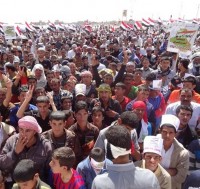Home » Kuwait » Press Releases » IRQ - News » Iraq: No Justice Six Months After 91 Demonstrator Deaths in Hawijah
Sit-ins were held in Hawijah, Kirkuk, Iraq, starting from early 2013, following a nation-wide trend. Amongst other demands, the demonstrators were seeking the release of detainees and the cancelation of the fourth article of the Iraqi Anti-Terrorism Law, which allows the death sentence of those charged with terrorism and related activities.
On Friday, 19 April 2013, clashes began between the Iraqi Armed Forces and the protestors. It is not clear what started the clashes, with both parties reporting that the other used force first. Soon after midday prayers that day, the military enforced a siege around the protest, cutting water, electricity and preventing any other supplies reaching the area. This siege continued until dawn on Tuesday, 23 April 2013, when the Iraqi Armed Forces, lead by the 12th Division of the Army, with the support of different military and police divisions and SWAT units used force to disperse the sit-in altogether. According to testimonies of people present, the forces employed tear gas, stun grenades, and live ammunition in the operation.
A Parliamentary Fact-Finding Committee was formed immediately after the incident, which visited Hawijah on 26 April 2013. According to its report published on 29 April, the dispersing of the sit-in resulted in 44 civilian deaths and that of one military personnel. The report added that the age range of those killed was between 13 and 55, and they were all male. The Health Division of the Governorate of Kirkuk, authorized by the Iraqi Ministry of Health, later stated that the number of civilian killed was in fact 91.
Alkarama was provided with the death certificates of 23 of these individuals, issued by the Health Division of the Governorate of Kirkuk, and dated 23 April 2013. The death certificates indicate that these 23 men were killed by bullet wounds on various parts of their bodies, indicating that the military and police forces did use live ammunition.
The report of the Parliamentary Committee gave nine recommendations, including that an independent investigation into the incident should be carried out and that judicial proceedings should be initiated in view of prosecuting those found to be responsible for the excessive use of force which had resulted in the death of the civilians. Subsequently, the Supervising Investigative Judicial Commission was established through an order from the Iraqi Supreme Judicial Council on 13 May 2013. This Commission includes four judges, and is mandated as the investigating body for the Hawijah events. Since its establishment, the Commission has received 500 complaints from injured demonstrators and families of demonstrators killed in the crackdown for investigation.
The Commission held a first hearing on 26 May 2013, and hearings are still continuing. However, the investigations have come to a halt since the military personnel summoned to present themselves before the Commission have not appeared. This seems to be due to the Ministry of Defense's refusal to approve for them to be heard by civil investigators or courts, a requirement specified by domestic legislation. Since 26 May, the Commission has submitted 27 communications to the Ministry of Defense asking for approval to question the military personnel involved in the events in Hawijah, which has so far failed to respond.
Alkarama commends that judicial investigations have been opened. We however deplore the lack of cooperation from the Government, particularly the Ministry of Defense, which threaten the impartiality and effectiveness of these investigations. We therefore take today as an opportunity to call on the Iraqi authorities to fulfill its international obligations to promptly and impartially investigate incidents of extrajudicial killing and to prosecute those believed to be responsible for the killings of protesters.
 Algeria
Algeria Bahrain
Bahrain Djibouti
Djibouti Egypt
Egypt Iraq
Iraq Palestine/Israel
Palestine/Israel Jordan
Jordan Kuwait
Kuwait Lebanon
Lebanon Libya
Libya Mauritania
Mauritania Morocco
Morocco Oman
Oman Qatar
Qatar Saudi Arabia
Saudi Arabia Sudan
Sudan Syria
Syria Tunisia
Tunisia United Arab Emirates
United Arab Emirates Yemen
Yemen Other Countries
Other Countries


